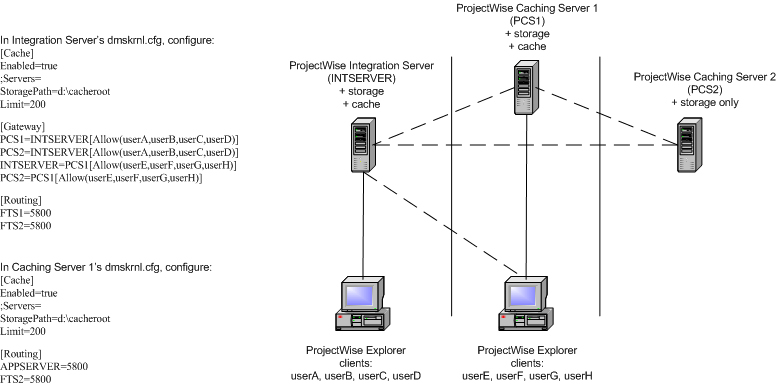Example B: Integration Server + storage + cache | Caching Server1 + storage + cache | Caching Server2 + storage
In this example there is an Integration Server and two Caching Servers. Each server has its own storage area. As in the previous example there are two sets of ProjectWise Explorer users: userA, userB, userC, and userD are local to the Integration Server, and userE, userF, userG, and userH are local to Caching Server 1.
The goal of this example is to enable caching on both the Integration Server and Caching Server 1, so that userA, userB, userC, and userD get all remote files from the cache on their local Integration Server, and so that userE, userF, userG, and userH get all remote files from the cache on their local Caching Server (PCS1).
Integration Server Configuration
-
The [Cache] section in the Integration Server's dmskrnl.cfg file tells the Integration Server to enable caching on this computer, where to store the files on this computer, and how much space the cache can take up before it gets purged.
[Cache] Enabled=true ;Servers= StoragePath=d:\cacheroot Limit=200
-
The [Gateway] section is echoed to all clients connected to the Integration Server, and instructs clients, who happen to be checking out or copying out files on remote servers, to instead get the files from the cache on their local server.
[Gateway] PCS1=INTSERVER[Allow(userA,userB,userC,userD)] PCS2=INTSERVER[Allow(userA,userB,userC,userD)] INTSERVER=PCS1[Allow(userE,userF,userG,userH)] PCS2=PCS1[Allow(userE,userF,userG,userH)]
The lines PCS1=INTSERVER[Allow(userA,userB,userC,userD)] and PCS2=INTSERVER[Allow(userA,userB,userC,userD)] tell the users listed that those file requests which would have gone to the Caching Server 1 (PCS1) or Caching Server 2 (PCS2), respectively, will instead be redirected to the Integration Server (INTSERVER). So when one of those users checks out a file stored on either Caching Server 1 or Caching Server 2, that user will instead be getting the file from cache on the local Integration Server. Since [Gateway] information is echoed to all clients connected to the Integration Server, the [Allow(userA,userB,userC,userD)] portion of each line ensures that only those users listed will be redirected to INTSERVER when making requests to PCS1 or PCS2.
The lines INTSERVER=PCS1[Allow(userE,userF,userG,userH)] and PCS2=PCS1[Allow(userE,userF,userG,userH)] tell the users listed that those file requests which would have gone to the Integration Server (INTSERVER) or Caching Server 2 (PCS2), respectively, will instead be redirected to the Caching Server 1 (PCS1). So when one of those users checks out a file stored on either the Integration Server or Caching Server 2, that user will instead be getting the file from cache on the local Caching Server (PCS1). Since [Gateway] information section is echoed to all clients connected to the Integration Server, the [Allow(userE,userF,userG,userH)] portion of each line ensures that only those users listed will be redirected to PCS1 when making requests to INTSERVER or PCS2.
-
The [Routing] section tells the Integration Server where to get files from when requests are received from clients.
[Routing] PCS1=5800 PCS2=5800
In this example, the line PCS1=5800 instructs the Integration Server that when files are requested from Caching Server 1 (PCS1), to get them directly from PCS1 through port 5800. The line PCS2=5800 instructs the Integration Server that when files are requested from Caching Server 2 (PCS2), to get them directly from PCS2 through port 5800.
Caching Server 1 Configuration
-
The [Cache] section in Caching Server 1's dmskrnl.cfg file tells the Caching Server to enable caching on this computer, where to store the files on this computer, and how much space the cache can take up before it gets purged.
[Cache] Enabled=true ;Servers= StoragePath=d:\cacheroot Limit=200
-
The [Routing] section tells Caching Server 1 where to get files from when requests are received from clients.
[Routing] INTSERVER=5800 PCS2=5800
In this example, the line INTSERVER=5800 instructs Caching Server 1 that when files are requested from the Integration Server (INTSERVER), to get them directly from INTSERVER through port 5800. The line PCS2=5800 instructs Caching Server 1 that when files are requested from Caching Server 2 (PCS2), to get them directly from PCS2 through port 5800.

